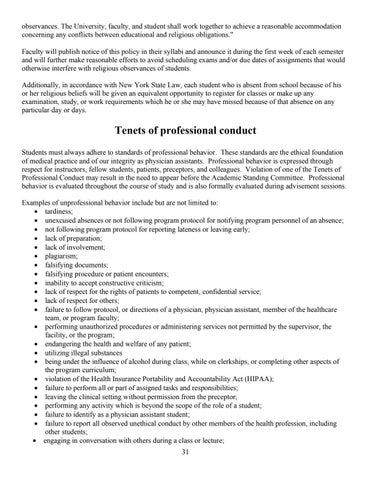observances. The University, faculty, and student shall work together to achieve a reasonable accommodation concerning any conflicts between educational and religious obligations.” Faculty will publish notice of this policy in their syllabi and announce it during the first week of each semester and will further make reasonable efforts to avoid scheduling exams and/or due dates of assignments that would otherwise interfere with religious observances of students. Additionally, in accordance with New York State Law, each student who is absent from school because of his or her religious beliefs will be given an equivalent opportunity to register for classes or make up any examination, study, or work requirements which he or she may have missed because of that absence on any particular day or days.
Tenets of professional conduct Students must always adhere to standards of professional behavior. These standards are the ethical foundation of medical practice and of our integrity as physician assistants. Professional behavior is expressed through respect for instructors, fellow students, patients, preceptors, and colleagues. Violation of one of the Tenets of Professional Conduct may result in the need to appear before the Academic Standing Committee. Professional behavior is evaluated throughout the course of study and is also formally evaluated during advisement sessions. Examples of unprofessional behavior include but are not limited to: • tardiness; • unexcused absences or not following program protocol for notifying program personnel of an absence; • not following program protocol for reporting lateness or leaving early; • lack of preparation; • lack of involvement; • plagiarism; • falsifying documents; • falsifying procedure or patient encounters; • inability to accept constructive criticism; • lack of respect for the rights of patients to competent, confidential service; • lack of respect for others; • failure to follow protocol, or directions of a physician, physician assistant, member of the healthcare team, or program faculty; • performing unauthorized procedures or administering services not permitted by the supervisor, the facility, or the program; • endangering the health and welfare of any patient; • utilizing illegal substances • being under the influence of alcohol during class, while on clerkships, or completing other aspects of the program curriculum; • violation of the Health Insurance Portability and Accountability Act (HIPAA); • failure to perform all or part of assigned tasks and responsibilities; • leaving the clinical setting without permission from the preceptor; • performing any activity which is beyond the scope of the role of a student; • failure to identify as a physician assistant student; • failure to report all observed unethical conduct by other members of the health profession, including other students; • engaging in conversation with others during a class or lecture; 31



